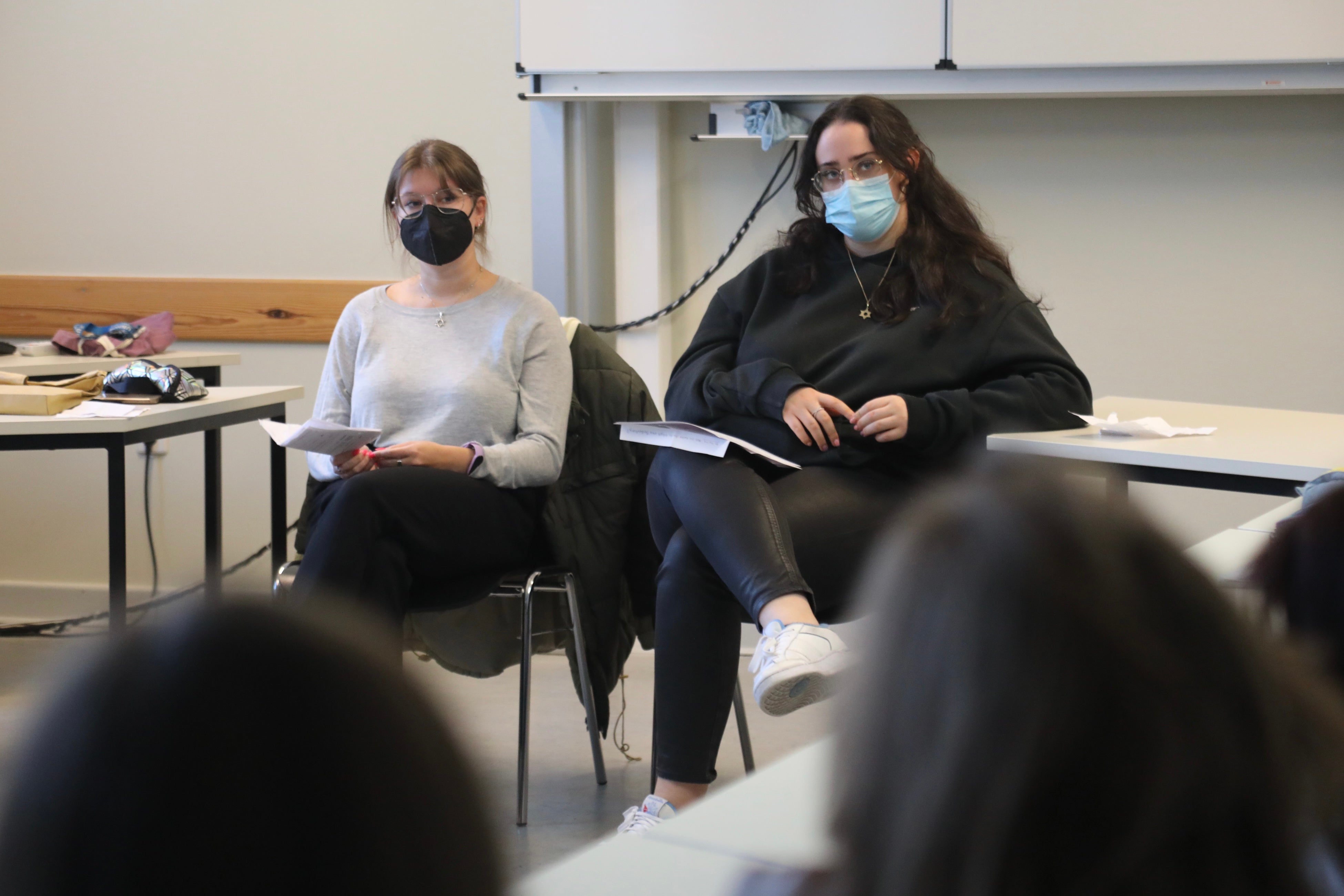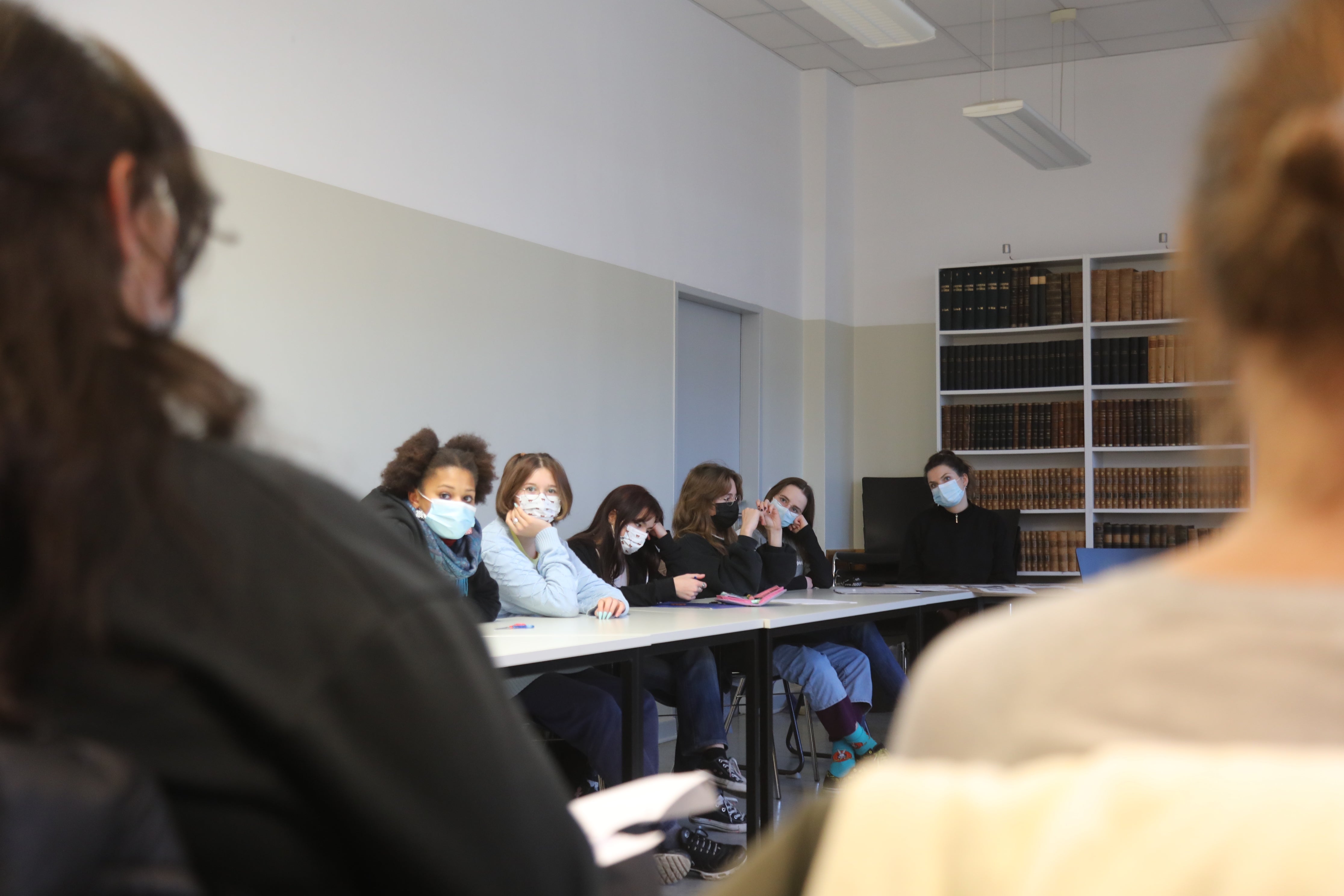‘Meet a Jew’: German scheme seeks to tackle stereotypes and antisemitism
The government-funded project encourages people in Germany to learn and think differently about the Jewish community at a time when antisemitic hate crimes are at a record high, writes Peter Yeung

Eagerly raising his arm for permission to speak, 11-year-old Niklaus makes a blunt observation to the pair of Jewish volunteers here to meet him and his classmates at a school in Berlin.
“I was expecting an old rabbi,” he says. “Not young women like you.”
It is exactly the kind of naive, unfiltered comment one might expect from a schoolchild, and the kind of stereotype that ‘Meet a Jew’ – a new government-funded project in Germany – is attempting to challenge as part of its educational and cultural outreach.
Niklaus’s fellow students at the Sophie Scholl school giggle at his question, but one of the two Jewish girls cuts the laughter short.
“There are no stupid questions,” says Karina, an 18-year-old psychology student who is one of 350 German Jewish volunteers in the programme. “Please don’t think too much about it. Just ask whatever comes into your head.”
The approach taken by Meet a Jew, which is run by the Central Council of Jews in Germany as part of the government’s “Living Democracy!” initiative, is to broaden perspectives about Judaism and Jewish life through relaxed and informal encounters.
The scheme was launched last year, and more than 500 such events have been held at schools, universities, sports clubs and many other institutions throughout 2021.
More than 75 years after the end of the Holocaust, the scheme feels vital and timely. Antisemitic hate crime is at a record high in Germany, while online abuse of Jews is soaring. The organisers of Meet a Jew do not work with groups that are overtly antisemitic.
The scheme’s volunteers – aged 14 and above – try to foster a personal and frank discussion with the audience rather than simply staging a pedagogic lecture.
By conveying Jewish identity as multi-faceted and modern, the organisers hope to combat antisemitic stereotypes and help to move German Jewishness beyond the important, but sometimes constraining, memory of the Holocaust.

“The image of Jewish people in Germany is often very abstract,” Mascha Schmerling, the scheme’s coordinator, tells The Independent.
“It’s almost always related to the Holocaust, or antisemitism, or when there is discussion about the politics of Israel. The result is that much of Germany doesn’t have any idea or connection with Jewish life and what it looks like. But the reality is that we are such a diverse society.”
Volunteer Karina’s chatty, outgoing and expressive personality helps to minimise any shyness among the pre-teen pupils.
She elegantly navigates queries spanning the Sabbath, sex, Kosher diets, football, Jewish holidays and her family history.
“This is a dialogue,” says Karina. “I am open to everything in the world. People of another faith have the right to exist and should be treated with respect and tolerance.”
The volunteers, who always work in pairs, are trained during weekend seminars, covering topics such as Judaism, Israel and antisemitism, as well as rhetoric and conflict-management.
On the one hand, it’s about preparing them for the meet-up events, but on the other, it’s about exploring and strengthening their own Jewish identity.
“Jewish people in Germany rarely get the opportunity to express themselves and their Jewishness in a positive way,” says Schmerling.
These experiences often make a lasting impression – and already lessons have been learnt at the school event led by Karina.
The mere existence of Meet a Jew shows that we’re still very far from normality
Few of the pupils knew that Jewishness is only passed down through mothers, for example. Another revelation for some is that only men wear the kippah. But the crucial message that appears to have been conveyed is that any person in the street, no matter what they look like or how they act, could be Jewish.
“I was expecting some very sad life stories and I thought it would be very scripted,” says one pupil, Ida. “But it wasn’t like that at all. It surprised my expectations about a lot of things.”
Layla El-Kassem, teacher of the school’s year 8 ethics class, echoes this sentiment. “Daring them to ask something new was very interesting,” she says. “It’s teaching them about tolerance, but also to question why they have the beliefs that they hold.”
But even as 2021 marked the 1,700th anniversary of Jewish life in Germany, ignorance about German Jews is rife. Only 0.2 per cent of the German population is Jewish, and according to a survey published last year, nearly half of the public have never come into contact with a Jew.
Underlining that research, Karina heard someone say during a previous Meet a Jew event: “I thought all Jews were dead.”
These events do not always run as smoothly as the one at the school in Berlin, according to the organisers. There are occasional moments when the line of questioning has become agenda-driven, making the volunteers uncomfortable. Karina recalls a time when she was pushed to justify the actions of the Israeli government in relation to Palestine – something she felt was not her duty.
“It can be tricky sometimes,” admits Schmerling. “The groups can ask anything. This project is an opportunity to explain and discuss some big questions. But being Jewish isn’t always about being Jewish, it’s about living life just how everyone does.”

The backdrop of rising antisemitic crimes in Germany, and the continued political success of the far-right Alternative for Germany (AfD) party, which holds about a tenth of seats in the Bundestag despite a recent setback, has put those problems into sharp focus.
The most recent government statistics show that antisemitic hate crimes are at a record high since German police started collecting data in 2001. There were 2,275 such crimes last year, and 55 of those were acts of violence.
Furthermore, a study published in 2021 by think tank the Institute for Strategic Dialogue found that online antisemitic content had increased thirteen-fold in Germany in a single year. Anti-vaxxers have also reportedly been comparing their experiences to those of Holocaust victim Anne Frank, and wearing yellow stars, like those the Nazis forced on Jews, at protests against the vaccines.
“I think the mere existence of [the Meet a Jew] programme shows that we’re still very far from normality,” says Michael Brenner, professor of Jewish history and culture at the University of Munich. “We shouldn’t just talk about the destruction of Jewish life but about what was there before, what was not destroyed, and what there is today.”
“Even though it’s 75 years after the Second World War and the Holocaust, being Jewish in Germany is still considered something different,” he adds. “The main stereotype about Jews, as with many minorities, is that they have all these ways of looking and behaving. But when you actually meet a person, you realise that they aren’t so different from you and I.”
For Karina, whose parents emigrated from Soviet-era Ukraine, sharing her story has at least helped add one piece to that ongoing puzzle of the Jewish experience in Germany.
“I’m not a person who likes to do something if I don’t agree with it,” she proudly tells the class in Berlin. “Everyone should believe what they want. If that means I want to eat a cheeseburger, then I will eat a cheeseburger. As a Jew, I have that choice.”
Join our commenting forum
Join thought-provoking conversations, follow other Independent readers and see their replies
Comments


Bookmark popover
Removed from bookmarks